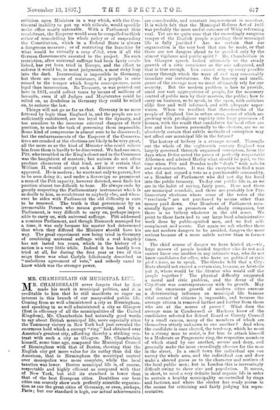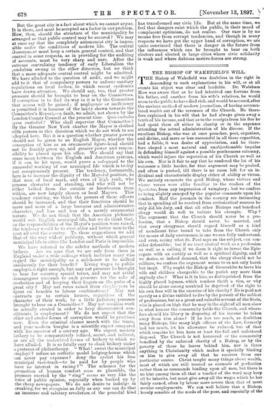MR CHAMBERLAIN ON MUNICIPAL LIFE.
MR. CHAMBERLAIN never forgets that he first made his mark in municipal politics, and it is creditable to him that he still manifests so eager an interest in this branch of our many-sided public life. Coming from so well administered a city as Birmingham, and speaking in so well administered a city as Glasgow (first in efficiency of all the municipalities of the United Kingdom), Mr. Chamberlain had naturally good words to say about British municipal life, more especially since the Tammany victory in New York had just revealed the enormous hold which a corrupt "ring" had obtained over America's greatest city, affording thereby a striking con- trast with such a city as Glasgow. Mr. Chamberlain himself, some time ago, compared the Municipal Council of Birmingham with that of Boston, showing that the English city got more value for its outlay than did the American, that in Birmingham the municipal control over monopolies was more complete, while the local taxation was lower. Boston municipal life is, of course, respectable and highly efficient as compared with that of New York, but still its standard is lower than that of the best European cities. Doubtless our best cities can scarcely show such perfectly scientific organisa- tion. as can the great cities of Germany, or even, perhaps, Paris ; but our standard is high, our actual achievements
are considerable, and constant improvement is manifest. It is widely felt that the Municipal Reform Act of 1835 was probably the most useful outcome of Whig reforming zeal. Yet are we quite sure that the exceedingly sanguine temper of the English people regarding their municipal life is fully justified ? Are we certain that our organisation is the very best that can be made, or that there are not dangers ahead to be avoided only by the
utmost vigilance and public spirit ? r. Chamberlain in his Glasgow speech looked ultimately to the steady growth of a civic conscience as the one safeguard, and. that is true enough. You cannot stop up every possible cranny through which the wave of evil may conceivably inundate our institutions. On the honesty and intelli- gence of the average man we must ultimately rely for our security. But the modern problem is how to provide,. amid our vast aggregations of people, for the necessary control of public men by their masters, the public; how to carry on business, so to speak, in the open, with criticism alike free and well informed, and with adequate super- vision. When we recollect that three-fourths of the people of England live in urban areas, some of which are growing with prodigious rapidity into huge provinces o£ houses, with the result that candidates for local office are less and less known personally to the electors, are we so absolutely certain that subtle methods of corruption may not affect our municipal life in the future?
The history of bribery is a strange record. Through- out the whole of the eighteenth century England was largely governed through organised corruption, from the days when Defoe noted the prices of perfectly respectable Aldermen and advised Harley what should he paid, to the time when Pitt and Dundas made " deals " with nabobs and war-contractors. It was the exception to find a man. who did not regard a vote as a purchaseable commodity, or a Member of Parliament who did not dip his hand into the public treasury. To-day our public life is, as we are in the habit of saying, fairly pure. Here and there are municipal scandals, and there are probably few Par- liamentary elections where some of the votes of the "residuum " are not purchased by means other than money paid down. Our Members of Parliament Occa- sionally figure as promoters of shady companies, but there is no bribery whatever in the old sense. We point to these facts and to our large local administrative work done by public-spirited men, and we feel self- complacent and secure. But again we ask whether there are not modern dangers to be avoided, dangers the more serious because of a more subtle nature than in former times.
The chief source of danger we have hinted at,—viz., huge masses of people herded together who do not and cannot know one another in any intimate way, who do not know candidates for office, who have no political or civic pied d term, so to speak. The Greeks held that a City- State should not exceed a certain size, because, as Aristotle put it, where would be the Stentor who would call the people together ? The physical difficulty suggested a moral and civic problem, and the decay of the City-State was contemporaneous with its growth. May not the enormous growth of modern cities exercise a deteriorating influence on municipal life because vital contact of citizens is impossible, and because the average citizen is removed farther and farther from those who are at the source of power ? What does the average man in Camberwell or Hackney know of the candidates selected for School Board or County Council by a small caucus, many of the members of which are themselves utterly unknown to one another ? And when. the candidate is once elected, the tendency, which he must be a strong man to resist, is for him to attach himself to a Moderate or Progressive ring, the respective members of which stand by one another, accuse and deny, and generally make the issue exceedingly obscure for the man in the street. In a small town the individual eye can survey the whole area, and the individual can and does make a shrewd guess as to the character and motives of the local public men; but in London this is increasingly difficult owing to sheer size and population. It seems, in short, to need a very definite local organic life in order to sustain a healthy municipality uncontrolled by rings and factions, and where the elector has ready access to the means for criticising and fairly judging his repre- sentative. But the great city is a fact about which we cannot argue. It is there, and must be accepted as a factor in our problem. How, then, should the structure of the municipality be arranged so that public control may be secured ? We may at once say that the completely autonomist city is impos- sible under the conditions of modern life. The central aovernment must keep a certain general control, and that control in some respects, as in providing for the auditing of accounts, must be very sharp and sure. After the extreme centralising tendency of early Liberalism the pendulum swung in the other direction, but we think that a more adequate central control might be admitted. We have alluded to the question of audit, and we might add to it that of compulsory powers to enforce sanitary regulations on local bodies, to which recent epidemics have drawn attention. We should say, too, that greater pressure should be brought to bear on the Committees. If corruption is to find its way in it is by the Committee that access will be gained ; if negligence or inefficiency is permitted it is because of the laxity shown towards the Committee's Report,--a fault, we admit, not shown by the London County Council at the present time. Quis custodes ipsos custodiet? Who shall supervise that Committee ? By the Greater New York charter the Mayor is clothed with powers in this direction which we do not wish to see adopted here. But it is a question whether greater powers should not be given to an English Mayor, whether the conception of him as an ornamental figure-head should not be frankly given up, and greater power and respon- sibility be placed upon his office. We should say that some mean between the English and American systems, if it can be hit upon, would prove a safeguard to the successful working of our municipal life which is to-day not conspicuously present. The tendency, fortunately, here is to increase the dignity of the Mayoral position, so that men of local mark, and even of high rank, who possess character and standing, and who will not be either bribed from the outside or browbeaten from within, are now largely chosen as local Mayors. This tendency existing, we think the powers of these officers should be increased, and that their functions should be more and more of a large business and administrative character, and less and less of a merely ornamental nature. We do not think that the American plebiscite would suit English municipal life, but we do think that, as the responsibilities of the Mayor's position were raised, the tendency would be to elect abler and better men to the post all over the country. To these suggestions we add that of the very widest publicity, without which general municipal life in cities like London and Paris is impossible.
We have referred to the subtler methods of modern bribery. Are we sure that we are safe from them in England under a wide suffrage which includes many who regard the municipality as a milch-cow to be milked assiduously for their benefit ? Living wages to public employ6s is right enough, but may not pressure be brought to bear for securing special terms, and may not artful demagogues succumb to such pressure for the sake of re-election and of keeping their fingers on the pulse of a great city ? May not rates raised from shopkeepers be spent on benefits to labour combinations ? May not contracts go to certain houses, regardless of the character of their work, by a little judicious pressure brought to bear on a Committee ? May not needless work be actually created in order to keep discontented con- stituents in employment ? We do not expect that the older and cruder forms of corruption would be practised now. Even the criminal classes march with the times, and your modern burglar is a scientific expert compared with his ancestor of a century ago. We expect modern bribery to be comparatively refined, secret, and indirect, as are all the undoubted forms of bribery to which we have alluded. It is so fatally easy to cloak bribery under a pretence of philanthropy. " What ! sweat the municipal employ6 ? refuse an msthetic model lodging-house which can never pay expenses ? deny the cyclist his free municipal race-track—to be paid for by people who have no interest in racing ? " The schemes for the promotion of human comfort seem so plausible, the pressure exerted by the " ring " seems so very like the voice of public opinion, especially when backed up by the cheap newspapers. We do not desire to indulge in croaking, for we recognise as fully as any one can do that an immense and salutary revolution of the peaceful kind has transformed our civic life. But at the same time, we feel that dangers exist which the public, in their mood of complacent optimism, do not realise. Our race is by no means free from corrupt tendencies, and though in many respects we have got the upper hand of corruption, we are quite convinced that there is danger in the future from the influences which can be brought to bear on both electors and elected in large cities where civic solidarity is weak and where dubious motive-forces are strong.







































 Previous page
Previous page